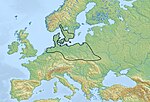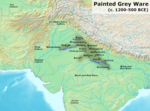The Jorwe culture was a Chalcolithic archaeological culture which existed in large areas of what is now Maharashtra state in Western India, and also reached...
3 KB (389 words) - 06:40, 9 May 2024
the middle of the second millennium (c. 1500 BCE), the Jorwe culture, a Deccan Chalcolithic culture, derived from the name of this site in Ahmednagar district...
4 KB (431 words) - 14:43, 26 January 2022
the Kayatha, Ahar-Banas, and Savalda cultures, and succeeded by the Jorwe culture and the Black and red ware culture. History of Madhya Pradesh Pottery...
3 KB (344 words) - 05:21, 23 July 2024
Daimabad (section Phase V: Jorwe culture)
buff/cream ware) (c.1800-1600 BCE) Phase IV: Malwa culture (c.1600-1400 BCE) Phase V: Jorwe culture (c.1400-1000 BCE). There is a break in occupation for...
13 KB (1,712 words) - 02:44, 9 October 2024
Kerma culture was an early civilization centered in Kerma, Sudan. It flourished from around 2500 BC to 1500 BC in ancient Nubia. The Kerma culture was based...
34 KB (3,967 words) - 09:41, 22 October 2024
Varna culture was a Chalcolithic culture of northeastern Bulgaria, dated c. 4500 BC, contemporary and closely related with the Gumelnița culture. The oldest...
14 KB (1,361 words) - 16:15, 2 November 2024
The Funnel(-neck-)beaker culture, in short TRB or TBK (German: Trichter(-rand-)becherkultur, Dutch: Trechterbekercultuur; Danish: Tragtbægerkultur; c...
38 KB (3,931 words) - 16:10, 21 October 2024
Cucuteni–Trypillia culture, also known as the Cucuteni culture or Trypillia culture is a Neolithic–Chalcolithic archaeological culture (c. 5500 to 2750...
104 KB (11,323 words) - 20:10, 20 November 2024
Bronze Age. Corded Ware culture encompassed a vast area, from the contact zone between the Yamnaya culture and the Corded Ware culture in south Central Europe...
78 KB (9,104 words) - 22:28, 16 November 2024
wheel instead the whole process is done by hand. Jorwe culture was a Chalcolithic archaeological culture which existed in large areas of what is now Maharashtra...
58 KB (6,417 words) - 18:47, 20 August 2024
settlement was excavated in order to better understand the early and later Jorwe culture. There are 3 phases of the Chalcolithic that are found at Inamgaon....
8 KB (542 words) - 02:44, 9 October 2024
The Painted Grey Ware culture (PGW) is an Iron Age Indo-Aryan culture of the western Gangetic plain and the Ghaggar-Hakra valley in the Indian subcontinent...
18 KB (1,841 words) - 02:37, 7 November 2024
2nd millennium BC (section Prehistoric cultures)
culture Oxus civilization East Asia Erlitou culture Wucheng culture South Asia Ahar–Banas culture Cemetery H culture Indus valley civilization Jorwe culture...
20 KB (1,571 words) - 19:12, 17 October 2024
25.95000°N 32.73333°E / 25.95000; 32.73333 The Naqada culture is an archaeological culture of Chalcolithic Predynastic Egypt (c. 4000–3000 BC), named...
37 KB (4,638 words) - 11:46, 2 November 2024
Black and red ware (redirect from Black and Red ware culture)
horses, paddy fields, iron tools etc. Kuru Kingdom Malwa culture Jorwe culture Rang Mahal culture, Rajasthan-Haryana border Pottery in the Indian subcontinent...
5 KB (609 words) - 09:27, 14 June 2024
brown colored design. Malwa culture (1900–1400 BC) had profusely decorated pottery with red or black colored design. Jorwe culture (1500–900 BC) had ceramics...
31 KB (3,432 words) - 14:51, 30 October 2024
The Gerzeh culture, also called Naqada II, refers to the archaeological stage at Gerzeh (also Girza or Jirzah), a prehistoric Egyptian cemetery located...
19 KB (1,709 words) - 18:42, 11 November 2024
Indus Valley Civilisation (redirect from Indus Valley Culture)
and later cultures called Early Harappan and Late Harappan in the same area. The early Harappan cultures were populated from Neolithic cultures, the earliest...
191 KB (21,640 words) - 20:36, 15 November 2024
Balathal Gilund Ojiyana Malwa culture Jorwe culture Pottery in the Indian subcontinent Hooja, Rima (July 2000). "The Ahar culture: A Brief Introduction". Serindian:...
7 KB (648 words) - 06:06, 2 October 2024
Anarta tradition (c. 3950–1900 BC) Ahar-Banas culture (3000–1500 BC) Pandu culture (1600–750 BC) Malwa culture (1600–1300 BC) Jorwe culture (1400–700 BC)...
16 KB (1,541 words) - 04:43, 14 November 2024
Lota (vessel) (category Culture of India)
Chalcolithic period, notably in the Savalda Culture and two well-preserved examples from the pottery of the Jorwe Culture, dating back to the 2nd millennium BCE...
10 KB (940 words) - 19:42, 10 November 2024
The C-Group culture is an archaeological culture found in Lower Nubia, which dates from c. 2400 BCE to c. 1550 BCE. It was named by George A. Reisner....
18 KB (2,057 words) - 03:47, 21 November 2024
culture Painted Grey Ware culture Black and red ware culture Bara culture Malwa culture Jorwe culture Other chalcolithic sites include Patapadu (Andhra Pradesh)...
23 KB (1,590 words) - 23:16, 15 November 2024
Vedic period (redirect from Vedic culture)
Archaeological cultures identified with phases of Indo-Aryan material culture include the Ochre Coloured Pottery culture, the Gandhara grave culture, the black...
77 KB (9,308 words) - 07:08, 20 November 2024
History of Assam (section Paleolithic cultures)
of the Austroasiatic, Tibeto-Burman (Sino-Tibetan), Tai and Indo-Aryan cultures. Although invaded over the centuries, it was never a vassal or a colony...
27 KB (3,611 words) - 04:03, 4 October 2024
and was used to write Sanskrit. The Shungas were important patrons of culture at a time when some of the most important developments in Hindu thought...
53 KB (5,479 words) - 17:54, 18 November 2024
Kosala (Mahajanapada) (section Culture)
the Northern Black Polished Ware culture (c. 700–300 BCE) and was culturally distinct from the Painted Grey Ware culture of the neighboring Kuru-Panchala...
26 KB (2,779 words) - 14:10, 20 November 2024
The Cemetery H culture was a Bronze Age culture in the Punjab region in the northern part of the Indian subcontinent, from about 1900 BCE until about 1300...
10 KB (1,040 words) - 16:18, 5 October 2024
Joseph Kitagawa, "The Religious Traditions of Asia: Religion, History, and Culture". Digital printing 2007, Routledge, ISBN 978-1-136-87590-8, archived from...
39 KB (4,831 words) - 01:19, 19 November 2024
Archaeology of India (section Chalcolithic cultures)
Pandu culture (1600–1500 BC) Malwa culture (1600–1300 BC) Daimabad site Jorwe culture (1400–700 BC) Megaliths in India date back to 5000 BC in southern India...
25 KB (2,735 words) - 18:38, 4 November 2024




















